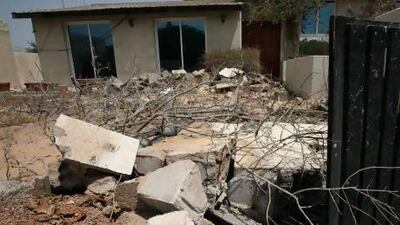DUBAI // A developer has reassured prospective tenants that the 36-year-old villas it is refurbishing at Jebel Ali Village will meet top quality standards despite five years of neglect.
Nakheel had originally planned to demolish the homes in 2008 and replace them with apartment blocks, and more than 300 families had to move out.
The project was dropped because of the economic downturn, and the villas remained empty. They are now being restored to be rented out again.
"I think it's good that the villas are back on the rental market, that they're actually utilising them," said Linda Pearson, who lived at the village for 17 years. "It's a good thing that they're not going to pull it down and they're going to let people live in it.
"My reservation would be, what damage is done to a property, especially in a very hot climate, when it's not used for five years, when the sewage system and all the rest of it are not used for five years?
"Moving back is something I'd consider, but I'd need to feel happy that the whole infrastructure was back up and running."
Nakheel said: "We undertook a full research and analysis project for the restoration of these villas, engaging a consultant to define the exact scope of repairs needed before appointing contractors to carry out the work. We are meeting all standards required by the relevant authorities.
"The villas are in big demand, more than 400 people - many of whom used to live in Jebel Ali Village before - have registered their interest."
The village near Ibn Battuta Mall was built in 1977 to house some of the few expatriates who then lived in Dubai.
Former tenants remember it fondly, and many have recorded their feelings on online forums.
One said: "I was a resident of the village for 17 years, brought up my kids there, built up my home and garden, had pets . you know it was a real home." Another said: "There was something very special about the village and the people who lived and worked there."
Ms Pearson, 60, from the UK, said: "I was very happy because it was a lovely community, there were lots of people around, they had the swimming pool, gym, restaurants - all that. It did have a very good community feel.
"It was very sad that they wanted to pull it down. It was at the crest of the property boom. I think it was a great loss, a community that was just killed dead over a few months. It would be lovely to open it up again.
"But I would have reservations about going back, because going back to anywhere where you were very happy may not be the best move. There are all sorts of considerations like that. And of course it's much busier around there, the road access is much more difficult now.
"The evening traffic coming off Sheikh Zayed Road is quite bad now but add another several hundred houses and the road infrastructure would need looking at as well."
Ms Pearson, who runs her own language school, now lives in the Springs. Her standout memories of the village include watching a Buddy Holly tribute band at the Jebel Ali Recreation Club, camels wandering into her garden, gazelles on the hillside and a powerful storm that battered the village in 1997.
"A bit of my heart is still in Jebel Ali Village," she said.
csimpson@thenational.ae

Nakheel pledge on villa renewal at Dubai Jebel Ali Village
Former residents expressed concerns over the extent of repairs needed after the community stood empty for five years.
Most popular today
8
